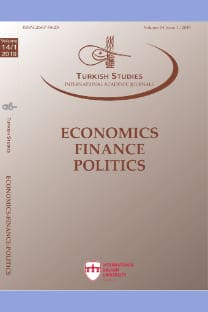SAĞLIK UYARI ETİKETİNİN, ALGILANAN KALİTE, ALGILANAN SAĞLIK RİSKİ VE SATIN ALMA EĞİLİMİNE ETKİSİ: ANKARA’DA BİR ARAŞTIRMA
THE EFFECT OF HEALTH WARNING LABEL ON PERCEIVED QUALITY, PERCEIVED HEALTH RISK AND PURCHASING TENDENCY: A RESEARCH IN ANKARA
___
- Andrew J.C., Burton S., & Kees J. (2011). Is simpler always better? Consumer evaluations of front-ofpackage nutrition symbols. Journal of Public Policy Marketing, 30(2), 175-190.
- Ang, F. J. L., Agrawal, S., & Finkelstein, E. A. (2019). Pilot randomized controlled trial testing the influence of front-of-pack sugar warning labels on food demand. BMC public health, 19(1), 164.
- Ares, G., Aschemann-Witzel, J., Curutchet, M. R., Antúnez, L., Moratorio, X., & Bove, I. (2018). A citizen perspective on nutritional warnings as front-of-pack labels: insights for the design of accompanying policy measures. Public health nutrition, 21(18), 3450-3461.
- Baker, M. J., & Churchill, G. A. (1977). The impact of physically attractive models on advertising evaluations. Journal of Marketing Research, 14, 538-555.
- Billich, N., Blake, M. R., Backholer, K., Cobcroft, M., Li, V., & Peeters, A. (2018). The effect of sugar-sweetened beverage front-of-pack labels on drink selection, health knowledge and awareness: An online randomised controlled trial. Appetite, 128, 233-241.
- Bollard, T., Maubach, N., Walker, N., & Mhurchu, C. N. (2016). Effects of plain packaging, warning labels, and taxes on young people’s predicted sugar-sweetened beverage preferences: an experimental study. International journal of behavioral nutrition and physical activity, 13(1), 95.
- Boncinelli, F., Gerini, F., Pagnotta, G., & Alfnes, F. (2017). Warning labels on junk food: experimental evidence. International Journal of Consumer Studies, 41(1), 46-53.
- Burton, S., Garretson, J., & Velliquette, A. (1999). Implications of accurate usage of nutrition facts panel information for food product evaluations and purchase intentions. Journal of the Academy of Marketing Science, 27(4), 470–480.
- Durkin, S., Brennan, E., Coomber, K., Zacher, M., Scollo, M., & Wakefield, M. (2015). Short-term changes in quitting-related cognitions and behaviours after the implementation of plain packaging with larger health warnings: findings from a national cohort study with Australian adult smokers. Tobacco control, 24, ii26-ii32.
- Effertz, T., Franke, M. K., & Teichert, T. (2014). Adolescents’ assessments of advertisements for unhealthy food: An example of warning labels for soft drinks. Journal of Consumer Policy, 37(2), 279-299.
- Fathelrahman A.I., Omar M., Awang R., Cummings K.M., Borland R., Samin A.S.B.M. (2010). Impact of the new Malaysian cigarette pack warnings on smokers’ awareness of health risks and interest in quitting smoking. Int J Environ Res Public Health, 7, 4089-99.
- Gökalp, F. (2007). Gıda Ürünleri Satın Alma Davranışında Ambalajın Rolü. Ege Akademik Bakış Dergisi, 7(1), 79-97.
- Khandpur, N., Mais, L. A., de Morais Sato, P., Martins, A. P. B., Spinillo, C. G., Rojas, C. F. U., ... & Jaime, P. C. (2019). Choosing a front-of-package warning label for Brazil: A randomized, controlled comparison of three different label designs. Food Research International, 121(2019), 854-861.
- Mantzari, E., Vasiljevic, M., Turney, I., Pilling, M., & Marteau, T. (2018). Impact of warning labels on sugar-sweetened beverages on parental selection: An online experimental study. Preventive medicine reports, 12, 259-267.
- Moran, A. J., & Roberto, C. A. (2018). Health warning labels correct Parents’ misperceptions about sugary drink options. American journal of preventive medicine, 55(2), 19-27.
- Mutti, S., Hammond, D., Reid, J. L., & Thrasher, J. F. (2013). The efficacy of cigarette warning labels on health beliefs in the United States and Mexico. Journal of health communication, 18(10), 1180-1192.
- Mutti-Packer, S., Collyer, B., & Hodgins, D. C. (2018). Perceptions of plain packaging and health warning labels for cannabis among young adults: findings from an experimental study. BMC public health, 18(1), 1361.
- Özgül, E., & Aksulu, İ. (2006). Ambalajlı Gıda Ürünlerinde Tüketicilerin Etiket Duyarlılığındaki Değişimler. Ege Akademik Bakış Dergisi, 6(1), 1-9.
- Popova, L. (2016). Sugar-sweetened beverage warning labels: lessons learned from the tobacco industry. Journal of the California Dental Association, 44(10), 633.
- Popova, L., Nonnemaker, J., Taylor, N., Bradfield, B., & Kim, A. (2019). Warning Labels on Sugarsweetened Beverages: An Eye Tracking Approach. American journal of health behavior, 43(2), 406-419.
- Purmehdi, M., Legoux, R., Carrillat, F., & Senecal, S. (2017). The effectiveness of warning labels for consumers: a meta-analytic investigation into their underlying process and contingencies. Journal of Public Policy & Marketing, 36(1), 36-53.
- Roberto, C. A., Wong, D., Musicus, A., & Hammond, D. (2016). The influence of sugar-sweetened beverage health warning labels on parents’ choices. Pediatrics, 137(2), e20153185.
- Rosenblatt, D. H., Bode, S., Dixon, H., Murawski, C., Summerell, P., Ng, A., & Wakefield, M. (2018). Health warnings promote healthier dietary decision making: Effects of positive versus negative message framing and graphic versus text-based warnings. Appetite, 127, 280-288.
- Sillero-Rejon, C., Attwood, A. S., Blackwell, A. K., Ibáñez-Zapata, J. A., Munafò, M. R., & Maynard, O. M. (2018). Alcohol pictorial health warning labels: the impact of self-affirmation and health warning severity. BMC public health, 18(1), 1403.
- VanEpps, E. M., & Roberto, C. A. (2016). The influence of sugar-sweetened beverage warnings: a randomized trial of adolescents’ choices and beliefs. American journal of preventive medicine, 51(5), 664-672.
- ISSN: 2667-5625
- Yayın Aralığı: 4
- Başlangıç: 2006
- Yayıncı: ASOS Eğitim Bilişim Danışmanlık Otomasyon Yayıncılık Reklam Sanayi ve Ticaret LTD ŞTİ
YEREL YÖNETİMLERDE TÜRKİYE’NİN MODERNLEŞMESİ VE STRATEJİK PLANLAMA
YEREL YÖNETİMLERDE EVSEL KATI ATIK YÖNETİMİ VE GELECEĞİ HAKKINDA BİR DEĞERLENDİRME
Didem SAYGIN, Orhan Veli ALICI
NATO’NUN BOSNA-HERSEK ASKERİ MÜDAHALESİ ÖNCESİ TÜRKİYE’NİN SİYASİ ÇABALARI
TÜRKİYE’DE KATILIM BANKALARININ PERFORMANS ÖLÇÜMÜ: CAMELS ANALİZİNE DAYALI BİR UYGULAMA
Bahar SUVACI, Hale ÖZBAKIR SELCANOĞLU
ÇALIŞANLARIN ETİK İKLİM ALGILAMALARININ İŞ TATMİNİ ÜZERİNDEKİ ETKİSİ: TÜKENMİŞLİĞİN ARACILIK ROLÜ
